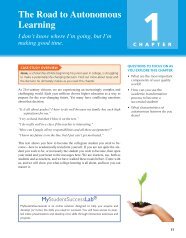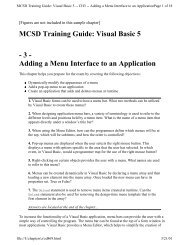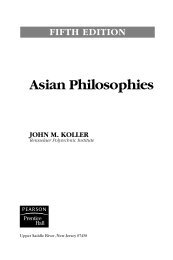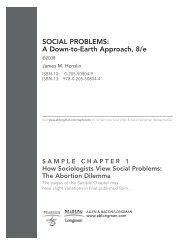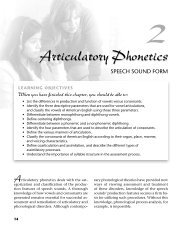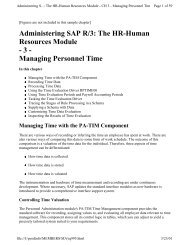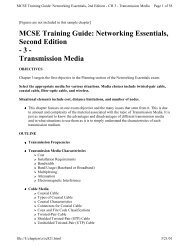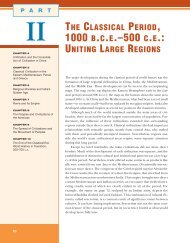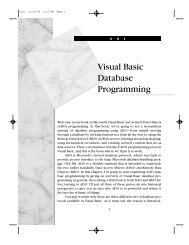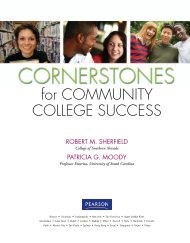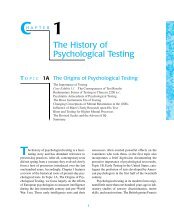CULTURE, language, AND COGNITION
CULTURE, language, AND COGNITION
CULTURE, language, AND COGNITION
Create successful ePaper yourself
Turn your PDF publications into a flip-book with our unique Google optimized e-Paper software.
GA305c05.qxd 4/30/2004 11:26 AM Page 109<br />
Developmental Factors<br />
A popular view claims that before a certain age children learn a <strong>language</strong><br />
naturally and easily. This supports the idea of a “critical period” for second<strong>language</strong><br />
acquisition. The “critical period” lasts a specific number of years<br />
during which a second <strong>language</strong> can be learned as easily and as well as the<br />
first <strong>language</strong>. However, after this critical period a <strong>language</strong> learner will have<br />
greater difficulty being able to acquire a second <strong>language</strong> to the same extent<br />
he or she did with the native <strong>language</strong>.<br />
The age at which this critical period is supposed to occur is one of several<br />
points debated by those interested in <strong>language</strong>. Penfield and Roberts<br />
(1959) set the first ten years of life as the critical years for <strong>language</strong> acquisition.<br />
Others suggest that no distinctions in <strong>language</strong> learning can be found<br />
until after puberty (Johnson and Newport, 1989). However, more recent<br />
studies contradict the “critical period” assumption entirely. In particular,<br />
Birdsong and Molis (2001) found that postpubescent learners were not always<br />
less proficient than younger learners and, in fact, some late-learners<br />
spoke the <strong>language</strong> as well as native speakers. This should not be the case if a<br />
true “critical period” for <strong>language</strong> acquisition exists. Hakuta, Bialystok, and<br />
Wiley (2003) report similar results in their analysis of data from over two<br />
million Spanish and Chinese immigrants. They observed a decline in second<strong>language</strong><br />
proficiency among older immigrants, but the decline was not as<br />
steep as might be expected outside a “critical period.”<br />
Although research does not completely support the claim that second<br />
<strong>language</strong> acquisition is limited by a “critical period” of development, we can<br />
reliably assume that “younger is better” when it comes to learning a second<br />
<strong>language</strong>. After a thorough review of existing research, Ellis (1994) concludes<br />
that (1) children learn a second <strong>language</strong> faster than adults in the<br />
long-run and (2) early second-<strong>language</strong> learners are more likely to have a<br />
nativelike pronunciation and proficiency than late-learners. Does this mean<br />
that taking <strong>language</strong> classes in high school or at the university are useless, as<br />
students cannot expect to become proficient in a second <strong>language</strong>? We now<br />
turn to the ecological model for additional insights on bilingualism.<br />
Ecological Factors<br />
infancy 109<br />
An easily identifiable ecological factor that influences second-<strong>language</strong> acquisition<br />
is the learning context itself. Sociolinguists distinguish two types of situations<br />
in which a second <strong>language</strong> can be learned including (1) natural settings<br />
and (2) educational settings. Examples of “natural settings” might<br />
include learning a second-<strong>language</strong> as a native <strong>language</strong> while living in<br />
a country—a setting familiar to most immigrants. A natural setting is also<br />
present when learning a second <strong>language</strong>s that serves as the “official <strong>language</strong>”<br />
of a country. For example, India maintains English as one of two “official”<br />
<strong>language</strong>s (Hindi being the other), which makes it necessary for many



